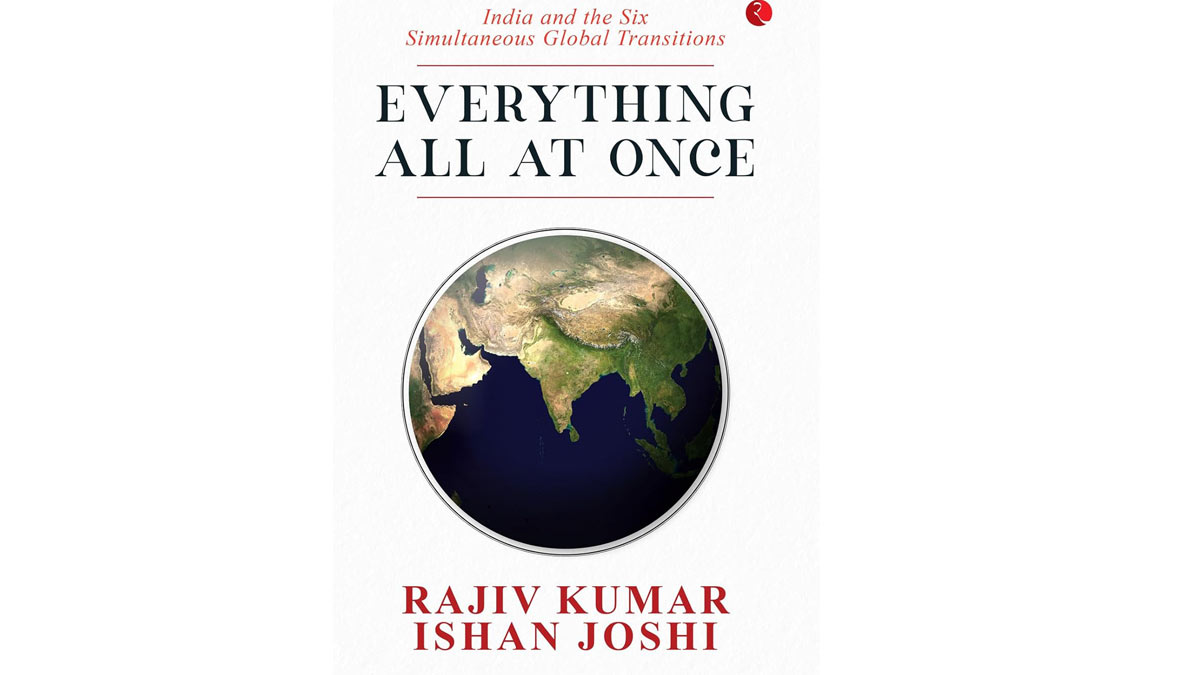'Everything All At Once' review: Charting India's course in a new global order

The book, Everything All At Once, by former NITI Aayog vice chairman Rajiv Kumar and policy expert Ishan Joshi is an incisive look at the extraordinary transformations reshaping the global order and their implications for India. The authors unpack the world for us as they refer to six major global shifts: geopolitical, geographical, economic, technological, environmental, and demographic—all happening simultaneously, reshaping the future.
These changes make the world uncertain. Nationalism is rising, and protectionist policies are changing the global economy. At the same time, the old world order led by the US is losing influence, while China’s power continues to grow. Russia is also challenging Western control. Emerging economies are gaining strength, and new opportunities are opening up. Advancements in digital technology and AI are changing economies, education, and healthcare. Could we afford to ignore the environmental factors, with the urgent need to reduce carbon footprints and tackle climate change more pressing than ever?
‘Everything All At Once’ is an important contribution to contemporary debates on India’s future in a rapidly changing world. As the global order changes with the decline of Pax Americana, the authors discuss the need for India to recalibrate its relationship with China. While acknowledging the security concerns between neighbours, the book suggests that India should not completely ignore the economic and technological benefits of engaging with China. They propose that India should focus on building a mutually beneficial relationship, particularly in frontier technologies where China has established significant expertise.
However, the authors stress that this engagement should not come at the cost of national security. India needs to build its domestic capacity to manage potential risks, such as cybersecurity threats, including concerns about spyware and malware.
Their suggestion almost sounds prescient, as the Trump tariffs are pushing India to engage with China. Prime Minister Narendra Modi’s visit to Beijing to attend the SCO summit points towards the two nations looking at a mutually beneficial partnership.
The authors explore the Viksit Bharat vision propounded by Modi, and how India can move towards it by also embracing the concept of Antyodaya, which focuses on providing for the last person in the queue.
As a way forward to deal with uncertainty, the authors outline eight key reforms - NITI Ashtanga. These reforms, if followed, could help India achieve its goal of becoming a developed nation by 2050. These include strengthening social unity; improving accountability in governance; committing to net-zero emissions; creating jobs and bringing them to areas where they’re needed most; using AI to improve education and healthcare standards; and rethinking the relationship between the government and the private sector.
The book also introduces the idea of a 'coalition of the willing' among countries in Asia and Africa to tackle global issues like climate change, technology, and security, where India must take the lead.
Kumar and Joshi argue that India’s current administrative system, inherited from its colonial past, is holding back progress. While some steps have been taken to address this, such as reforming the criminal justice system, more needs to be done to improve governance at all levels.
The book also devotes attention to technology and human capital. India’s demographic dividend, the authors note, can only be fully realised through investment in education, digital infrastructure, and skill development.
As the authors discuss the global rise of India, calling it 'Vishwamitra rises', they remind us that social cohesion is essential, as “unbridled majoritarianism” will erode, rather than reinforce, our capacity to address challenges. “Sabka Saath, Sabka Vikas must apply to the entire population without any exception.”
‘Everything All At Once’ is wide-ranging and deep in its analysis. It is an important read for anyone interested in India’s future and its role in the global order. It is a call to action for Indian policymakers and thought leaders, as it nudges them to recognise and act upon the ongoing shifts.
Book: Everything All At Once
Written by: Rajiv Kumar and Ishan Joshi
Published by: RUPA
Price: Rs 695
Pages: 235
Books Review